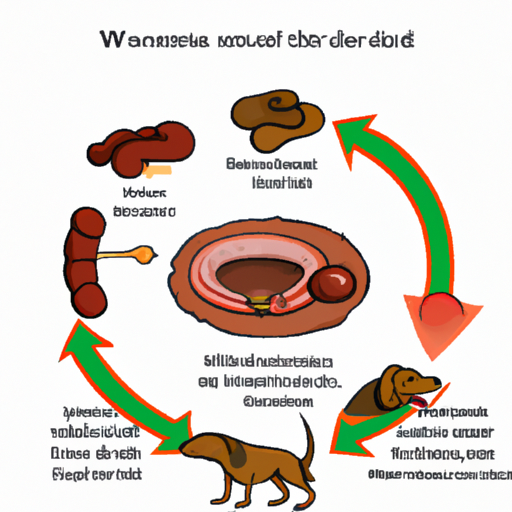As a caregiver, you’re always on the lookout for any potential harm that might come to your loved ones, including your furry friends. So, it’s concerning when you hear about common diseases like roundworms in dogs. How do dogs get roundworms? What can you do to prevent it? Let’s dive into the details, shall we?
H2: Understanding Roundworms
Roundworms, scientifically known as Toxocara canis, are a type of parasite that primarily infects dogs. These parasites are spaghetti-like in appearance and can grow up to 7 inches long. Despite their unpleasant appearance and effects, understanding roundworms is the first step in safeguarding your dog’s health.
H2: The Lifecycle of Roundworms
The lifecycle of roundworms is complex, but it’s essential to know how they operate. Here’s a simplified version:
- Infestation: The roundworm lifecycle begins when a dog ingests roundworm eggs from contaminated soil, feces, or other infected animals.
- Development: Once inside the dog’s body, the eggs hatch into larvae.
- Migration: The larvae then migrate to the dog’s liver and lungs.
- Maturation: After several weeks, the larvae return to the intestine, where they mature into adult roundworms.
- Reproduction: The adult roundworms lay eggs, which are passed in the dog’s feces and can infect other dogs.
H2: Modes of Transmission of Roundworms in Dogs
Dogs can get roundworms in several ways:
- Ingestion of Infected Soil or Feces: This is the most common way. Dogs love to explore and often end up eating things they shouldn’t.
- Mother to Puppy Transmission: Puppies can get roundworms from their mother’s milk if the mother is infected.
- Consumption of Infected Animals: Dogs that eat rodents or other small animals infected with roundworms can also get infected.
H2: Signs, Symptoms, and Treatment of Roundworms
Recognizing the signs of roundworms in your dog can help you seek treatment early. Symptoms may include:
- Vomiting or diarrhea
- Weight loss
- Dull coat
- Potbelly appearance
- Coughing (if the larvae have migrated to the lungs)
If you notice any of these symptoms, seek veterinary care immediately. Treatment typically involves deworming medication and may require follow-up doses.
H2: Preventing Roundworms in Dogs
Preventing roundworms is easier than treating them:
- Regular Vet Check-ups: Regular fecal examinations can detect roundworms early.
- Proper Hygiene: Clean up after your dog promptly to prevent soil contamination.
- Control Rodent Population: Limit your dog’s exposure to rodents, a common source of roundworms.
- Safe Feeding Practices: Avoid feeding your dog raw meat, which can contain roundworm larvae.
Frequently Asked Questions
Q: Can humans get roundworms from dogs?
A: Yes, roundworms can be transmitted from dogs to humans, especially children who play in contaminated soil.
Q: How often should I deworm my dog?
A: This depends on your dog’s lifestyle and your vet’s recommendation. Some dogs may need deworming every 3 months, while others may need it less frequently.
Q: Can I prevent roundworms with a vaccine?
A: Unfortunately, there’s no vaccine for roundworms. However, regular deworming and preventive measures can keep your dog safe.
Q: Can roundworms be fatal to dogs?
A: In severe cases, roundworms can cause serious health issues and even be fatal, especially in puppies. Early detection and treatment are key.



